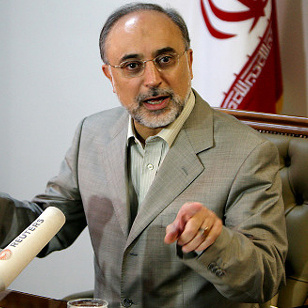Qatar and Iran...and Saudi Arabia

 On Monday of last week, Iranian FM Ali Akbar Salehi made a one-day visit to Doha to meet the Qatari crown prince and foreign minister. Hossein Ruyvaran, Middle East expert, discusses the implications of Iran's relations with Qatar.
On Monday of last week, Iranian FM Ali Akbar Salehi made a one-day visit to Doha to meet the Qatari crown prince and foreign minister. Hossein Ruyvaran, Middle East expert, discusses the implications of Iran's relations with Qatar.IRD: What goal was Ali Akbar Salehi following on his recent visit to Qatar?
HR: The region is in a state of change- both broad and deep- and popular uprisings span from North Africa to the Persian Gulf. Iran and Qatar have felt the need for diplomatic coordination. Meanwhile, relations between Iran and Qatar have become warm and friendly during recent years, and the heads of state pay frequent visits to each other’s countries.
IRD: The [Persian] Gulf Cooperation Council’s recent statement is pointedly harsh toward Iran. Can Salehi’s visit encourage Qatar to mitigate the current atmosphere of suspicion between Iran and its southern neighbors?
HR: The Persian Gulf has never been a show of unanimity. Internal differences run deep, even deeper than problems with Iran. A few months ago, Oman reported the discovery of a UAE-sponsored spy cell in its territory. The scandal created tensions between Abu Dhabi and Musqat. So thinking of the Council as a united team is wrong. Oman, traditionally, and Qatar have had close ties with Iran and have objected to anti-Iran policies. So, naturally, Iran would start any proximity plans from these two countries.
IRD: The Saudis have given voice to the anti-Iran wing in the GCC. Can Qatar offset Saudi Arabia’s efforts?
HR: Doha has mustered its resources to counter Riyadh’s efforts. It may be dwarfed by Saudi Arabia’s population, area, and strategic depth, but has wielded Aljazeera and an active engagement in regional affairs to buy itself diplomatic prestige. The Doha-Riyadh struggle- bubbling under the surface- weakens unity in the Council, foils the formation of an anti-Iran front and eases tensions in the region.
IRD: As tensions between Iran and the Persian Gulf Cooperation Council escalates, Qatari officials say that reconciliation between Iran and Saudi Arabia will create a better opportunity for broader ties between Tehran and Doha. Do you agree that Iran's relations with Qatar hinge on its relations with Saudi Arabia, or can they be pursued independently?
HR: I think Tehran-Doha relations are independent from the mode of ties with Saudi Arabia. Qatar has serious territorial problems with Saudi Arabia –bordering on a limited war- and will not sacrifice its ties with Tehran for the sake of Riyadh.
IRD: Can Qatar be a broker between Iran and Saudi Arabia?
HR: It can be a long-term objective, but this is not a point to discuss now. Iran and Saudi Arabia are in a head-to-head battle in Bahrain, and neither side has plans to withdraw.
IRD: How deeply has Qatar been influenced by developments in other Arab countries? Could its approach toward Iran be interpreted as a reflection of its concern about the spread of popular protests to its own country?
HR: A reproduction of Arab protests in Qatar is highly unlikely. The 400 thousand ethnic Qataris enjoy welfare and sense no need to change the status quo.

